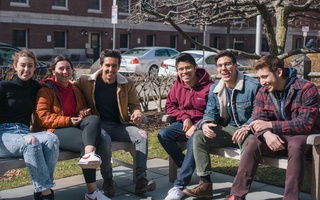{shortcode-91e1384ed8d36d263e82ddaef84c184c153a718d}
The First Generation Student Union plans to change its name by early fall, following recent board elections that resulted in an almost full turnover of power.
FGSU leaders announced via email last month that they will officially change their name “to better reflect the community [they] have always served since [their] inception five years ago.”
The core mission of the student-led group—which formed five years ago— is to distribute knowledge and resources to students who feel unprepared when they first arrive on campus.
Andrew Perez ’20, the former president of FGSU, said the name change has been in the works since Visitas last year, when multiple students asked about the definition of the ‘first-gen’ label.
“There were all these different complicated questions that came with being first-gen. First-gen is an identity, but it's more than anything a feeling. It's a feeling of not understanding how institutions of higher education work,” Perez said. “We realize that that feeling doesn't specifically pertain to that specific identity but kind of that general circumstance of not belonging.”
Charity E. Barros ’18, former vice-president of FGSU, said the organization decided to pursue the name change so that all students who shared those feelings of “not belonging” would feel that they had a space in FGSU.
FGSU President Brandon Buell ’20 said he and several other members of the group initially opposed changing the group’s name, but hearing from students who felt excluded from the group changed their minds.
Buell said that while he identifies strongly with being a first-generation college student, he understands how other students from under-resourced backgrounds may not use the term to classify themselves.
“The problem I suppose with that is there are people who are very much not first-gen—there are people who identify only as low-income or specifically from an under-resourced community—they feel they've always felt that even though we've been fighting for them, they don't belong to the group just because of the name,” Buell said.
Buell said this emphasis on inclusivity is reflected in the new board, which group members elected April 1. The entirety of the new board—with the exception of Buell—are first-time board members, and they come from a variety of backgrounds.
“A lot of racial minorities are well-represented, sexual identities well-represented, and the people on the board are not necessarily first-gen anymore—some identify with the low-income, under-resourced community statuses instead,” he said.
Buell also said FGSU is connected to First-Year Retreat and Experience, or FYRE, the new pre-orientation program created to serve first-gen, low-income, and under-resourced freshman. He said FGSU does not oversee FYRE, but that the programs are “closely related.”
Perez, now one of the program chairs for FYRE, said he is also interested in developing the relationship between FGSU and FYRE, especially since they will serve the same students and provide them with similar resources.
“The biggest thing is figuring out how we form a cohesive body that is big but also caters to the individual. Those powers and those ideas are consolidating into one which will make it helpful to be able to move forward,” he said.
FGSU’s decision to move away from the ‘first-generation’ label comes a month after FYRE’s program name announcement, which also deliberately leaves out the words “first generation.”
James A. Bedford ’20, co-director of FYRE, described the decision in an interview last month as a way to increase outreach to under-resourced students.
Barros, who has served on the FGSU board since 2016, said that while the organization is changing on paper, it will remain true to its original purpose of uplifting students and providing them with resources necessary to thrive.
“Something we really want to preserve in the new name is that being first-gen, low-income, under-represented, all of those things, that identity is not defined by its obstacles. That identity is identified by the pride in overcoming those obstacles,” Barros said.
“Being on the board, you can sometimes lose sight of that because you have to advocate so hard and so frequently,” she added. “At the end of the day, my unofficial goal, my dream for FGSU, or whatever it's named in the future, is that people will leave that space or that community feeling proud of where they come from, where they're going, and where they are now.”
—Staff writer Paula M. Barberi can be reached at paula.barberi@thecrimson.com. Follow her on Twitter @paulambarberi.
—Staff writer Ruth A. Hailu can be reached at ruth.hailu@thecrimson.com. Follow her on twitter @ruth_hailu_
Read more in College News
Wale and Lil Yachty Draw Hundreds to Yardfest













